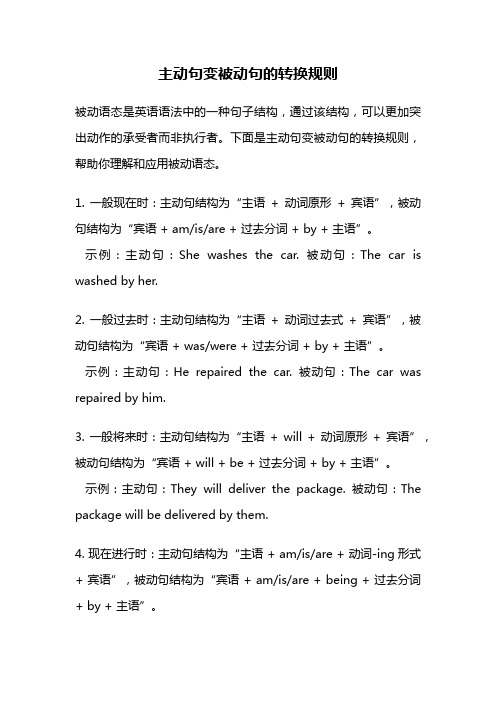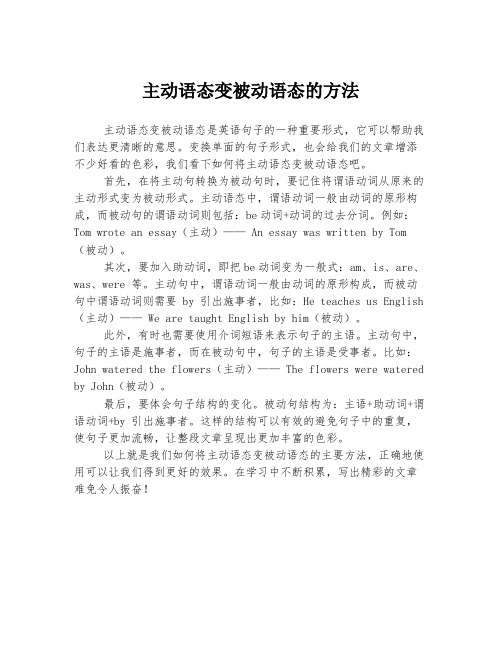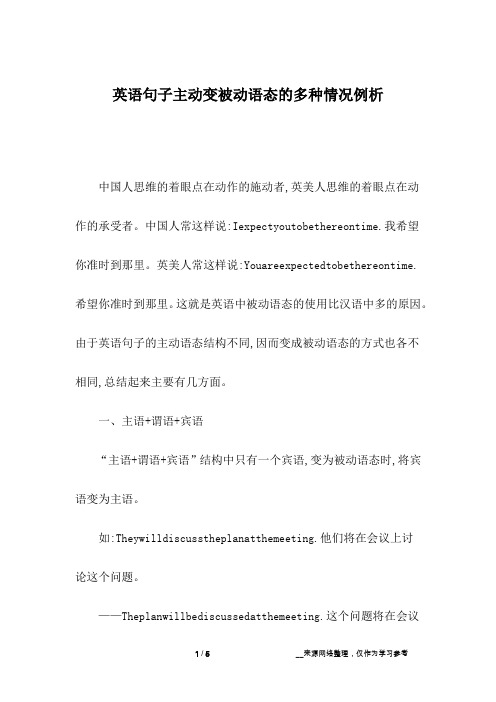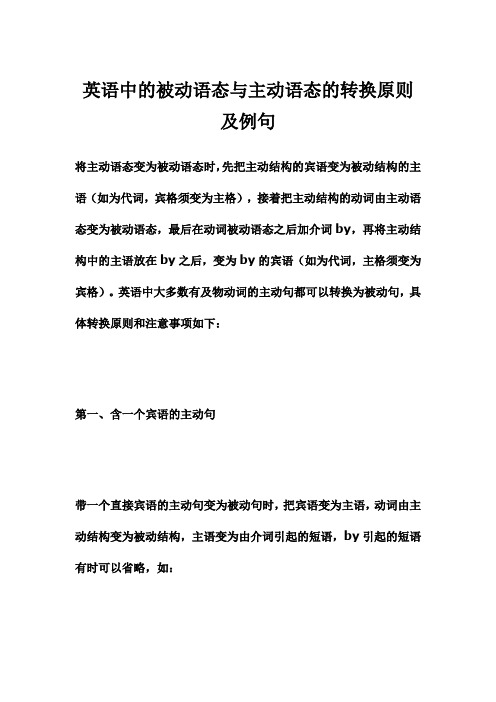主动句变被动句
主动句变被动句的转换规则

主动句变被动句的转换规则被动语态是英语语法中的一种句子结构,通过该结构,可以更加突出动作的承受者而非执行者。
下面是主动句变被动句的转换规则,帮助你理解和应用被动语态。
1. 一般现在时:主动句结构为“主语+ 动词原形+ 宾语”,被动句结构为“宾语 + am/is/are + 过去分词 + by + 主语”。
示例:主动句:She washes the car. 被动句:The car is washed by her.2. 一般过去时:主动句结构为“主语+ 动词过去式+ 宾语”,被动句结构为“宾语 + was/were + 过去分词 + by + 主语”。
示例:主动句:He repaired the car. 被动句:The car was repaired by him.3. 一般将来时:主动句结构为“主语+ will + 动词原形+ 宾语”,被动句结构为“宾语 + will + be + 过去分词 + by + 主语”。
示例:主动句:They will deliver the package. 被动句:The package will be delivered by them.4. 现在进行时:主动句结构为“主语 + am/is/are + 动词-ing形式+ 宾语”,被动句结构为“宾语 + am/is/are + being + 过去分词+ by + 主语”。
示例:主动句:She is writing a letter. 被动句:A letter is being written by her.5. 过去进行时:主动句结构为“主语 + was/were + 动词-ing形式+ 宾语”,被动句结构为“宾语 + was/were + being + 过去分词+ by + 主语”。
示例:主动句:They were preparing dinner. 被动句:Dinner was being prepared by them.6. 现在完成时:主动句结构为“主语 + have/has + 过去分词 + 宾语”,被动句结构为“宾语 + have/has + been + 过去分词 + by + 主语”。
主动语态变被动语态的几个特例

主动语态变被动语态的几个特例一、含有双宾语的句子变为被动语态时,多数将主动句中的间接宾语变为被动句的主语,直接宾语作保留宾语;也可将直接宾语变为主语,间接宾语作保留宾语,但这时保留宾语前多加介词to或for。
如:He gave me a new watch.→1) I was given a new watch.2) A new watch was given to me.二、含有复合宾语且宾语补足语是名词的句子变为被动语态时,只能将主动句中的宾语变为被动句中的主语,宾补不可变为主语。
如:They call me Jim.→I am called Jim.(不可说:Jim is called me.)三、主语为疑问词的疑问句变为被动语态时,用“By+疑问词(宾格)”置于句首。
如:Who broke the glass?→By whom was the glass broken?四、祈使句变为被动语态时,要改为“Let +原宾语+be+过去分词”。
如:Close the window.→Let the window be closed.五、带宾语从句的复合句变为被动语态时,多用it作形式主语置于句首,原宾语从句成为真正主语(从句),从句中也需用被动语态。
如:People said that Lin Feng could take good care of the baby.→It was said that the baby could be taken good care of by Lin Feng.六、含有谓语动词know的主动句变为被动语态时,不用by短语,需by改为to。
如:We all know the scientist.→The scientist is known to us all.七、no one、nobody等否定代词作主语的句子变为被动语态时,谓语动词用否定式,不再用原主语,但可加上byanyone、byanybody等短语。
主动语态变被动语态的方法

主动语态变被动语态的方法
主动语态变被动语态是英语句子的一种重要形式,它可以帮助我们表达更清晰的意思。
变换单面的句子形式,也会给我们的文章增添不少好看的色彩,我们看下如何将主动语态变被动语态吧。
首先,在将主动句转换为被动句时,要记住将谓语动词从原来的主动形式变为被动形式。
主动语态中,谓语动词一般由动词的原形构成,而被动句的谓语动词则包括:be动词+动词的过去分词。
例如:Tom wrote an essay(主动)—— An essay was written by Tom (被动)。
其次,要加入助动词,即把be动词变为一般式:am、is、are、was、were 等。
主动句中,谓语动词一般由动词的原形构成,而被动句中谓语动词则需要 by 引出施事者,比如:He teaches us English (主动)—— We are taught English by him(被动)。
此外,有时也需要使用介词短语来表示句子的主语。
主动句中,句子的主语是施事者,而在被动句中,句子的主语是受事者。
比如:John watered the flowers(主动)—— The flowers were watered by John(被动)。
最后,要体会句子结构的变化。
被动句结构为:主语+助动词+谓语动词+by 引出施事者。
这样的结构可以有效的避免句子中的重复,使句子更加流畅,让整段文章呈现出更加丰富的色彩。
以上就是我们如何将主动语态变被动语态的主要方法,正确地使用可以让我们得到更好的效果。
在学习中不断积累,写出精彩的文章难免令人振奋!。
被动语态讲解(1)主动句变为被动句所遵循的4个步骤:

被动语态讲解(1)主动句变为被动句所遵循的4个步骤:初中被动语态语法讲解主动句变为被动句所遵循的4个步骤:1、把原主动句中的宾语变为被动句的主语2、把动词变为被动形式即be +过去分词,并注意其人称和数随主语的变化,而动词的时态则保持不变。
3、原主动句的主语如需要则放在by后面以它的宾格形式出现(注代词的宾格),如不需要则可省略。
4、其它的成分(定语、状语)不变。
(一) 语态分类英语动词有两种语态.,主动语态和被动语态。
主动语态表示主语是动作的执行者,被动语态表示主语是动作的承受者。
如:They will build a new bridge over the river. (主动)A new bridge will be built over the river. (被动)汉语中常用“被”、“给”、“由”、“受”等词用来表示被动,而英语用:助动词be + 及物动词的过去分词构成。
(二) 被动语态的时态、人称和数的变化主要体现在be的变化上,其形式与系动词be的变化形式完全一样。
一般现在时:am / is / are + done一般过去时:was / were + done一般将来时:shall / will + be done一般过去将来时:should / would + be done现在进行时:am / is / are + being + done过去进行时:was / were + being + done现在完成时:have / has + been + done过去完成时:had + been + done将来完成时:shall / will + have been + done过去将来完成时:should / would + have been + done[注]被动语态没有将来进行时和过去将来进行时。
(三)常见的八种时态中的被动语态1. 一般现在时:(1)People grow rice in the south of the country.Rice is grown in the south of the country.(2)The school doesn't allow us to enter the chemistry lab without a teacher. We are not allowed to enter the chemistry lab without a teacher.2. 一般过去时:(1)They agreed on the building of a new car factory last month.The building of a new car factory was agreed on last month.(2)The students didn't forget his lessons easily.His lessons were not easily forgotten3. 一般将来时:(1)They will send cars abroad by sea.Cars will be sent abroad by sea.(2)They will give plenty of jobs to school-leavers.Plenty of jobs will be given to school-leavers.4. 过去将来时:(1)The manager said they would complete the project by the end of the year. The manager said the project would be completed by the end of the year. (2) The workers told me they would mend the car as soon as possible.The workers told me that the car would be mended as soon as possible.5. 现在进行时:(1)The radio is broadcasting English lessons.English lessons are being broadcasted on the radio.(2) We are painting the rooms.The rooms are being painted.6. 过去进行时:(1)The workers were mending the road.The road was being mended.(2)This time last year we were planting trees here.Trees were being planted here this time last year.7. 现在完成时:(1)Someone has told me the sports meeting might be put off.I have been told the sports meeting might be put off.(2)He has brought his book here.His book has been brought here.8. 过去完成时:(1)When I got to the theatre, I found they had already sold out the tickets.When I got to the theatre, I found the tickets had already been sold out.(2) The whole country was very sad at the news of his death; People had considered him to be a great leader.He had been considered to be a great leader(四)含有情态动词的被动语态:含有情态动词的被动语态是由“情态动词+ be+ 及物动词的过去分词”构成。
英语中的主动句被动句

主动句和被动句大多数“主-动-宾”结构的主动句都可以转换为被动句。
规则如下:(1)将原来的宾语变为主语,并将原来的主动态动词词组变为被动态动词词组。
例如:This factory produces machine tools.→Machine tools are produced in this factory.The found a wallet in the car.→A wallet was found in the car.They are repairing the bridge.→The bridge is being repaired.They have repaired the bridge.→The bridge has been repaired.They often make fun of her.→She is often made fun of.He took great care of his books.→His books were taken great care of.→Great care was taken of his books.(2)如果原句带有情态动词或半助动词,在变为被动句时,助动词不变,随后的主动词变为被动态。
例如:They should do this right now.→This should be done right now.They may be interviewing the applicants at the moment.→The applicants may be being interviewed at the moment.They must have finished their work.→Their work must have been finishedHe is likely to let you down.→You are likely to be let down.(3)当主动句变被动句,如果要强调施动者,可将原句主语置于by-词组中表达出来。
英语句子主动变被动语态的多种情况例析

英语句子主动变被动语态的多种情况例析中国人思维的着眼点在动作的施动者,英美人思维的着眼点在动作的承受者。
中国人常这样说:Iexpectyoutobethereontime.我希望你准时到那里。
英美人常这样说:Youareexpectedtobethereontime.希望你准时到那里。
这就是英语中被动语态的使用比汉语中多的原因。
由于英语句子的主动语态结构不同,因而变成被动语态的方式也各不相同,总结起来主要有几方面。
一、主语+谓语+宾语“主语+谓语+宾语”结构中只有一个宾语,变为被动语态时,将宾语变为主语。
如:Theywilldiscusstheplanatthemeeting.他们将在会议上讨论这个问题。
——Theplanwillbediscussedatthemeeting.这个问题将在会议上讨论。
二、主语+谓语+间接宾语+直接宾语在这个句型中,谓语动词后有两个宾语。
变成被动语态时,一般将通常指人的间接宾语转化成主语,但有时也可将指物的间接宾语转化成主语。
如:Wegavethestudentsomebooks.我们给了这个学生几本书。
——Thestudentwasgivensomebooks.这个学生被给了几本书。
注意:用直接宾语作被动语态的主语时,通常要在间接宾语前加上适当的介词三、主语+谓语+宾语+宾语补足语在这个句型中,谓语动词后有一个宾语和一个宾语补足语,变成被动语态时,宾语转化成主语,宾语补足语也随之变为主语补足语。
如:Allthevillagerspaintedthehouseswhite.所有村民都把房子涂成了白色。
——Thehouseswerepaintedwhitebyallthevillagers.房子被所有的村民都涂成了白色。
注意:有些使役动词和感官动词,如make,see,hear,watch,notice,observe,listento等,在主动结构中跟不带to的动词不定式作宾语补足语,在变为被动结构时,不定式应加上to。
英语中的被动语态与主动语态的转换原则及例句

英语中的被动语态与主动语态的转换原则及例句将主动语态变为被动语态时,先把主动结构的宾语变为被动结构的主语(如为代词,宾格须变为主格),接着把主动结构的动词由主动语态变为被动语态,最后在动词被动语态之后加介词by,再将主动结构中的主语放在by之后,变为by的宾语(如为代词,主格须变为宾格)。
英语中大多数有及物动词的主动句都可以转换为被动句,具体转换原则和注意事项如下:第一、含一个宾语的主动句带一个直接宾语的主动句变为被动句时,把宾语变为主语,动词由主动结构变为被动结构,主语变为由介词引起的短语,by引起的短语有时可以省略,如:主动句:People play football all over the world.被动句:Football is played all over the world.第二、含双宾语的主动句带一个直接宾语和一个间接宾语的主动句变为被动句时,只把其中一个宾语变为主语,如:主动句:My friend lent me those books.被动句:Those books were lent (to) me by my friend.第三、含两个直接宾语的主动句带有两个直接宾语的主动句变为被动句时,通常只把表示人的宾语改为主语,表示事物的宾语一般不变,如主动句:They asked him some questions.被动句:He was asked some questions (by them).第四、含that宾语从句的主动句当含有that的宾语从句的主动句变为被动句时,通常以间接宾语作为主语,that从句不变;主动句:She told me that the teacher would come soon.被动句:I was told that the teacher would come soon.第五、含复合宾语的主动句带有宾语和宾语补足语的主动句变为被动句时,把宾语变为主语,原来的宾语补足语保留不变,但在作用上为主语补足语。
汉语主动句译成英语被动句方法

汉语主动句译成英语被动句方法汉语主动句译成英语被动句方法汉语主动句译成被动句我们在汉译英时,往往也需要把汉语主动句译成被动句。
这是因为:为了保证上下文连贯,使衔接更紧密,句子更自然;或强调动作承受者;或使语气婉转、措辞恰当。
具体转换方法有如下两种。
1)把汉语主动句的宾语译成英语被动句的主语。
例1 ____________(将领你们去参观我们的新车间)by the secretary. 来自译文:You will be shown our new workshop.简评:如果这句话不是划线填内容,你完全可以将它翻译成The secretary will show you our new workshop。
正是因为题型是补全句子,这就给翻译带来了一定的难度,你必须去适应题型要求而不是让题型来适应你。
让我们看看译文已给出部分:by the secretary显然是一个被动语态特征,“秘书”在译文里已经由原来的主语变成了译文句子的补足成分。
所以,题目是暗示我们要把原句中“你们”转换成译句里的主语,这样才符合出题要求。
例2 You __________(我们期待你能组织贸易推广活动)this time.译文:are expected to organize the trade publicity campaigns.简评:根据题目可推知全句意思是:我们期望你能组织这次的贸易推广活动。
中文句子主语、谓语、宾语分别是:我们、期望、你。
但是在英文译文的给出部分中我们看到句子以you开头,也就是说“你被期望能组织这次贸易推广活动”。
中文的宾语变成了英文的主语,这就要求我们在翻译时要使用被动语态。
全句完整答案是:You are expected to organize the trade publicity campaigns this time.2)当汉语句以“我们”、“人们”、“大家”等泛指性代词作主语时,在翻译成英文的时候常常可以忽略主语不译,并把英文译句处理成被动语态。
- 1、下载文档前请自行甄别文档内容的完整性,平台不提供额外的编辑、内容补充、找答案等附加服务。
- 2、"仅部分预览"的文档,不可在线预览部分如存在完整性等问题,可反馈申请退款(可完整预览的文档不适用该条件!)。
- 3、如文档侵犯您的权益,请联系客服反馈,我们会尽快为您处理(人工客服工作时间:9:00-18:30)。
主动句变被动句
John helped Peter. ----- Peter was helped by John.
转换规则
1、主动句变被动句的实质是将主语和宾语的位置对调,动词由原来的形式变为be加上动
词的过去分词。
如不需要突出动作的执行者,也可不要by-词组。
They punished the criminal. ----- The criminal was punished.
2.如果主动句带有情态助动词或半助动词,在变为被动句时,情态动词或半助动词保持不变,谓语动词由主动变为被动。
They should do the work at once. ----- The work should be done at once.
They must have finished their work. ----- Their work must have been finished.
He is likely to let you down. ------ You are likely to be let down.
3、如果主句是双宾语结构,变为被动句时刻有两种形式:一种是以间接宾语作主语;另
一种是以直接宾语作主语。
They offered him some assistance.
----- He was offered some assistance.
----- Some assistance was offered to him.
Father gave me a watch.
----- I was given a watch.
----- A watch was given to me.
4、如果主句的结构带有宾语补足语,变被动的时候要将原来的宾语补语变为主语补语。
We have painted the windows white. ----- The windows have been painted white.
They elected Tom monitor of the class. ---- Tom was elected monitor of the class.
5、当主动句变为被动句时,有时用by-词组,有时不用。
一般来说,当施动者为谁不太清
楚、不甚重要或不愿说出时,通常不用by词组。
但有时为了强调施动者,则须用by 词组。
Hamlet was written by Shakespeare.
Susan was cheated by David.
有时为了避免中途变更主语,不得不用被动句而把施动者置于by-词组中。
He arrived at London where he was met by his friend.
Practice
1.They built this house in 1968.
2.People speak English almost all over the world.
3.No one has ever beaten him at once.
4.They use milk for making butter and cheese.
5.They are repairing my piano at the moment.
6. Somebody had cleaned my shoes.
7.He said they were starting a new system.
8.You can’t wash this dress; you must dry-clean it.
9.They will have to adopt a different attitude.
10.People mustn’t leave bicycles in the hall.。
